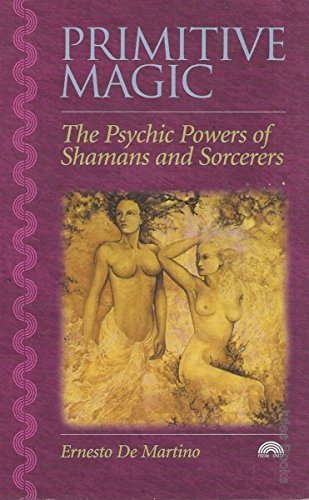
- ISBN: 1853270210
- Date Read: ca. 2025-07-01
- Enjoyment: 8/10
- Recommendation: 5/10
What do we mean when we say that shamans use “magic” powers? Is this magic merely a farce or display, a trickery lacking any substance? Or is it something real—something with an existence of its own? De Martino would certainly affirm the latter, though it goes against the whole Western concept of reality. As Paul Saye White says in the introduction, “What is ‘real’ for us is not necessarily real for other civilizations, whether they be ancient, primitive, or contemporary with our own.” De Martino develops this idea throughout the book, though it is not clear if he is actually advocating for some kind of ontological pluralism, or equivocating on the world “real.” (He also seems to be operating on a thoroughly Hegelian view of history).
Regardless of what one thinks about the metaphysics of it, De Martino brings up fascinating points about the psychological, noumenal, and social dimensions of shamanism, which is his focus. Shamanism, as it turns out, is the centerpiece of the magico-historical drama that primitive cultures around the world engage in. These shamans function as “magical christs” who take on the burden and risk of a weak presence to not only emerge stronger themselves, but become the foundation for the stability of the whole tribe.
The book is divided into three sections:
- The Problem of Magical Powers deals with the challenge of significant evidence of magical powers for the standard Western view. De Martino presents extensive examples of first-hand accounts of magic, from impossible firewalks to ventriloquism to clairvoyance. He also discusses issues of interpretation, and possible biases preventing a fair analysis of these accounts.
- The Historical Drama of the Magic World develops De Martino’s idea of the magical drama and the shaman’s place in it. He explores how exactly all the seemingly contradictory aims and methods of magic fit together in a compelling narrative that sustains primitive peoples, and allows for engagement a world that we no longer have access to, for better or worse.
- The Problem of Magical Powers in the History of Ethnology relates standard interpretations and theories of magic in the study of ethnology, and shows how many of them fail to properly understand magic and the deeply historical role it plays in primitive societies, viewing it instead in anti-historical and abstract terms that evaporate the very meaning and substance of magic.
Notes and Excerpts
But sooner or later there must be some consideration given to the fact that this problem involves not just the quality of magic powers, but also our concept of reality. The research embraces not just the subject under dispute (magic powers), but the very criterion of judgment (the concept of reality). (3)
The practice of conscious loss of consciousness practised by the shamans and candidates to become shamans gives hundreds of facts which confirm the hypothesis of the existence of the soul. (5)
The first reaction is often to withdraw from the argument by stating flatly that magic powers are ‘a priori’ impossible; at the most, some people will admit curiosity as to how primitive tribes and even some Europeans are so effectively convinced that the illusions are real. But whatever the attitude, it cannot be denied that ethological documents do show that the problem of reality of illusion does exist. (15)
There is no known set of laws that may be used to govern experiments in the area of paranormal phenomena. Experimental science, when dealing with nature, has the ideal of a nature that purified of any of the psychic ‘projections’ that belong to the world of magic, whereas paranormal phenomena are precisely part of a nature that is made up of such ‘projections’. It follows that even the mere possibility of paranormal phenomena is repugnant to modern scientific thought. If it was to accept such a possibility, it would mean one of two things: either it would have to create some means of ‘dialogue’ with the magic world, and thus reject its historical origins, or else it would have to rise above its own historical background and attain a higher, more comprehensive outlook. Science was born through the gradual withdrawal of psychic elements from the natural world. The possibility of paranormal phenomena would be a complete contradiction, because the paranormal means the reintroduction of the psychic element into nature. And if this ‘small world of hysterical mediums’ joins up with the historical world of ethnological magic, then we have the paradox of a ‘culturally conditioned nature’, that is, one that may still be considered to be at man’s disposal, one that sustains and expresses a distinct cultural drama. (45)
So long as the natural scientist’s ‘given facts’ are seen as the only possible method of approach, these contradictions will persist. But this dogmatism of the natural scientist is basically a presumption inherent in the culture. Wundt reveals the real motive that blocks the way to an uninhibited consideration of magic powers when he talks of Western man’s preference for the ‘marvellous universe of Galileo and Newton’—that is, for a universe that lends itself to observation and to experimentation; one that may be explained rationally, within the limits of established scientific law. This attitude is part of our present stage of cultural development and our problem takes root here because of the reaction we may expect to the question of the reality of magical powers. (45)

If we analyse this state of olon, we find tat it is characterized by a complete abandonment of control, as if there is some element present that surrenders itself completely to an outside force, It is as if this insecure , unstable presence is unable to withstand the shock of some emotive force; it cannot accept and master this force within the framework of relationships with which it is familiar. (68)
Olonism does show one aspect which could lead to cultural developments. In certain cases the olonized individual makes a visible effort to resist the influences. He does not accept his susceptibility and will not give himself up passively when faced with these influences; he reacts. He becomes anguished, and this anguish expresses his will to retain his identity when confronted with the threat of losing it. Its fragility is the problem—he must defend and redeem it as best he can; he tries to reintegrate it. (69)
